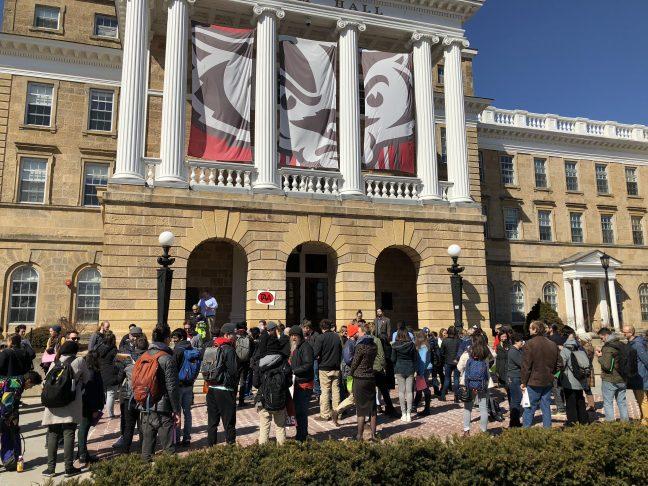More than a year ago, the University of Wisconsin System Board of Regents passed a policy committing it to academic freedom and freedom of expression. Particularly, it requires that protesters who repeatedly disrupt speakers on campuses be punished with suspension and ultimately expulsion. In response, UW updated its policy in compliance with the System policy, defining disruptive behavior and outlining other guidelines.
On March 21, 2019, President Donald Trump signed the “Executive Order on Improving Free Inquiry, Transparency, and Accountability at Colleges and Universities.” The president “seeks to promote free and open debate on college and university campuses.” The order accomplishes this by directing the Department of Education, among other agencies, to withhold federal research or education grants from institutions that fail to promote free inquiry or First Amendment rights.
Given UW’s current free speech policy, this provision will likely have zero effect on Wisconsin’s public universities.
Opponents to this executive action question it as a potential overreach of federal power. As most of the institutions receiving these research grants are state universities, this is certainly a question that deserves an answer.
Because these state universities receive federal financial assistance, they are already required to comply with other non-discrimination statutes — such as Title IX, which prohibits sex discrimination, or Title VI of the Civil Rights Act of 1964, which prohibits discrimination based on race or national origin. It is certainly not unfathomable to expect universities to uphold federal law when receiving federal funding.
Furthermore, the First Amendment has been completely incorporated to the states by the Supreme Court, meaning that its prohibition against federal action abridging the rights of the citizens also applies to state action. This means that no state may make a “law respecting an establishment of religion, or prohibiting the free exercise thereof; or abridging the freedom of speech, or of the press; or the right of the people peaceably to assemble, and to petition the Government for a redress of grievances.”
As state universities are institutions of state governments, the First Amendment applies, and universities must be held to these standards. This executive action simply makes violation more threatening by requiring universities to uphold the First Amendment and ensure “free inquiry,” or lose federal research funding.
As this is the case, then perhaps this threat is unnecessary. If student’s rights are violated, schools are already liable to torts and lawsuits. As such, this provision is likely only an attempt by Trump to scare or strong-arm universities into taking a look at their policies and refocusing on the need for diversity and discourse.
UW is no stranger to controversy in this regard. For instance, in 2017, a student posted a video on a university-provided storage site which displayed provocative messaging and depicted violent imagery. A Wisconsin state legislator caught wind of the video and argued that police should investigate. The university and UWPD recognized the video as protected speech, agreeing with the assessment of then-Attorney General Brad Schimel that “the student unquestionably has the First Amendment right to engage in hateful speech like this.” In the end, the video was removed for violating the site’s terms of service. This might have been a scapegoat for the university, but they should certainly be applauded for their protection of speech, even offensive speech.
And no discussion about free speech at UW could be free from mentioning the events which transpired at the Young Americans for Freedom event with Ben Shapiro. A conservative pundit, Shapiro’s speech saw protest and shouts from students who believed he was a threat to safety and a purveyor of hate speech. In preparation for the event, police were informed of plans to protest. They allowed the protests to occur, monitoring for safety concerns, but allowed the disruptions nonetheless. A UW spokeswoman said that “protests are a part of a vibrant campus community; we facilitate them to ensure they do not jeopardize free speech, teaching, research or safety. Successful facilitation safely provides for the expression of First Amendment rights while at the same time not infringing any other individual’s First Amendment rights.” Its likely the new UW System policies were created in response to this event, which garnered national media attention and controversy.
In lieu of these events and many others, UW has affirmed its commitment to protecting the First Amendment rights of its students and faculty.
UW should be applauded for its commitment to freedom and should continue striving to protect rights in a manner similar to the University of Chicago Statement for Free Speech, which guarantees “all members of the University [sic] community the broadest possible latitude to speak, write, listen, challenge, and learn,” and makes clear that “it is not the proper role of the university to attempt to shield individuals from ideas and opinions they find unwelcome, disagreeable or even deeply offensive.” Such a policy ensures intellectual diversity and a space for dialogue and disagreement. If it holds to this commitment, the university has nothing to fear from this frivolous and needless executive action.
Andrew Stein (andrew.stein@wisc.edu) is a senior majoring in political science and economics.


